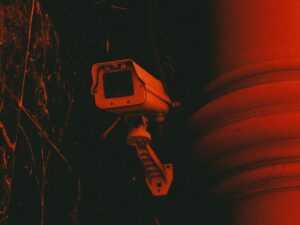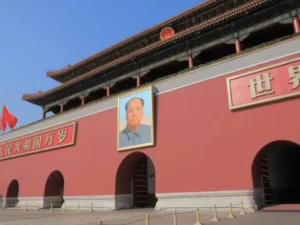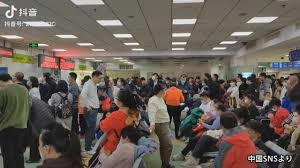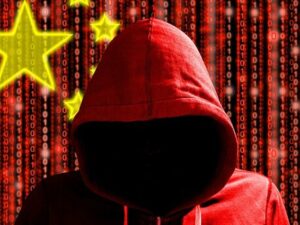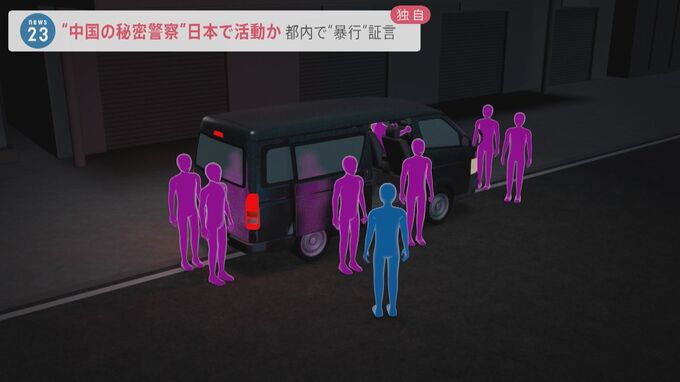
A Chinese democracy activist testified to JNN that he was threatened and assaulted by men in Tokyo and other locations. The democracy activist group believes that there is a high possibility that this is an activity by China’s “overseas secret police”. What is the reality of the “secret police,” which are said to have bases all over the world?
Chinese “secret police” operating in Japan?
It was late at night when I was on my way home from a convenience store. As he passed by a parked car, a complete stranger suddenly called out his name in fluent Chinese.
Mr. A, a Chinese democracy activist
“He asked if we could get in the car and talk a little, but I said, ‘I can’t do that, can we talk here?'”
Mr. A has been engaged in political activities for democracy in China. However, in order to escape severe repression, he came to Japan two years ago. He had just started working in Tokyo in the financial sector.
The man who spoke to her got out of the car and urged her to get back in, and when she refused, five more men got out.
Mr. A, a Chinese democracy activist
(The man) told me, “(The man) is a young foreign student around you, going back and forth between several groups. He told me not to have any contact with this kind of people.
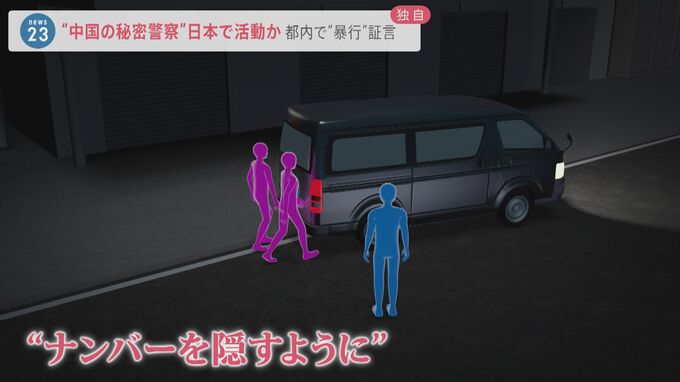
The “young students” were men who were engaged in democratic activities in Japan, and Mr. A said he took this as a warning from the Chinese authorities.
The other men stood silently. The two men behind him did not get on the bus, but walked away as if to hide the license plate.
Chinese democracy activist A.
I am convinced they are secret police. Their methods were very professional.
Feeling that he was in danger, Mr. A moved out. But it did not end there.
Two months later, in the middle of Kabukicho, Shinjuku. Around 8 p.m., as Mr. A was walking home from work, three men approached him from the front and took him into a side street. They were different men from the previous time.
Mr. A, a Chinese democracy activist
They said, “You know who we are. They told us to work for them or quit the company. They said they would guarantee me RMB 16 million as my compensation.”
The compensation offered was over 300 million Japanese yen.
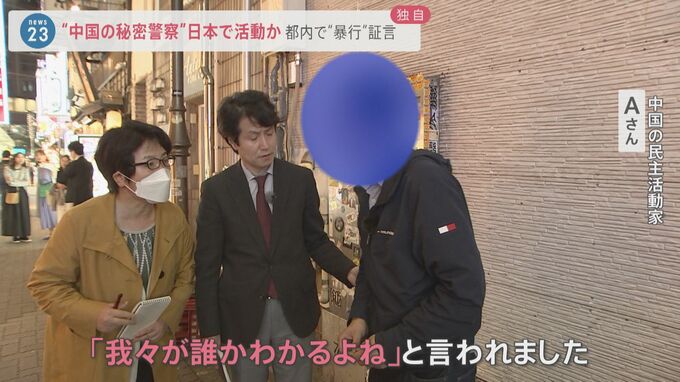
–What did you think was the meaning of this offer to work for them?
Mr. A, Chinese democracy activist
The consistent practice of the CCP is to infiltrate various sectors to gather information on people, businesses, and families for the party. It is an act of betrayal of friends. It’s done all the time inside China.”
I took it as a request to do espionage work in Japan. But Mr. A refused. This refusal led to further threats.
In February 2023, Mr. A was returning home when suddenly a plastic bag was placed over his head.
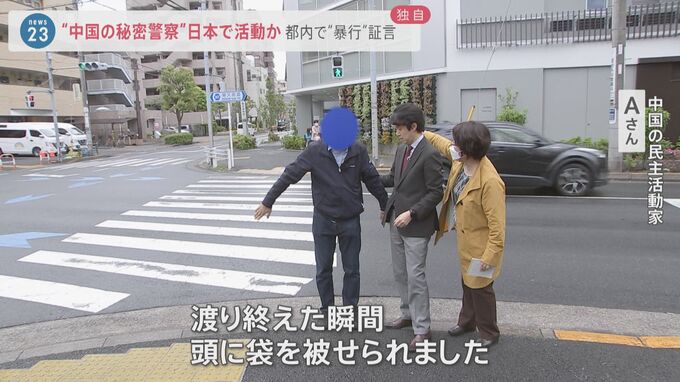
Mr. A, a Chinese democracy activist
“The moment I finished crossing (the road), they put a bag over my head.”
–Came from behind you?
Chinese democracy activist, Mr. A
They grabbed me by the neck, brought me over here, hit me two or three times around here, brought me over here, held me down, and beat me.
He said he felt the presence of several men.
Mr. A, a Chinese democracy activist
The men said, “Don’t open your mouth so openly. I will stop here this time, but if you try to report me to the police, this will not be the end.
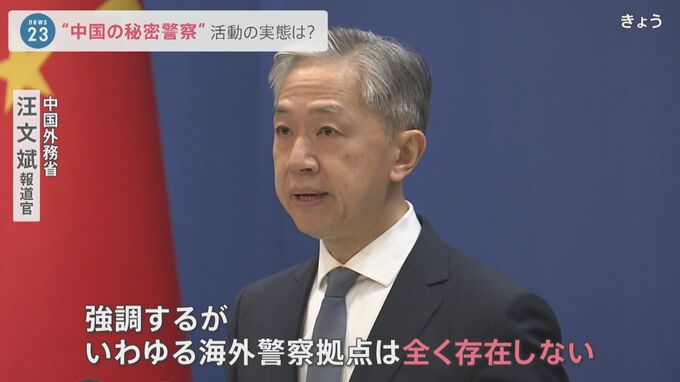
After saying these words in a Northeast Chinese accent, he left.
The threats escalated into acts of violence. Who are these men? The leader of an organization that continues democratic activities in Japan considers them to be “the activities of China’s overseas secret police.
Mr. Wang Dai, Vice President of the Democratic China Front
This is the place. This is Fuzhou, the capital of Fujian Province.
According to a report by an international human rights organization, this building is believed to be the “base of the Chinese secret police in Japan. Wang’s organization has been holding protests in front of the building.
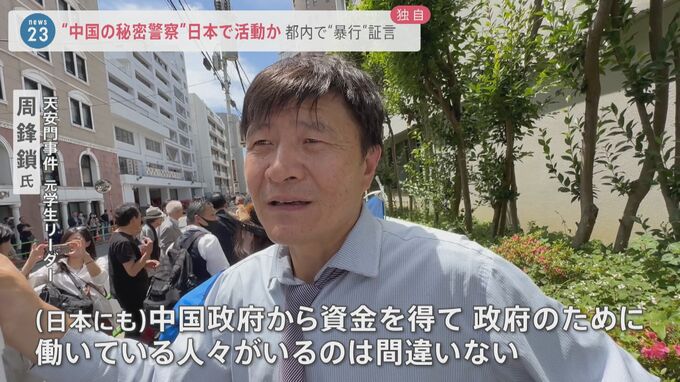
Mr. Wang Dai, Vice President of the Democratic China Front
The target (of the secret police) is to crack down on people in the dissident camp. There are a lot of Chinese people living abroad who do this as a ‘warning. They warn us that it is never good to do this kind of thing.
Former student leader of the Tiananmen Square protests living in the U.S.
Former student leader of the Tiananmen Square protests, Mr. Zhou Fengchain
There is no doubt that there are people in Japan who are working for the Chinese government with funding from the Chinese government. I think we need to look into such organizations.
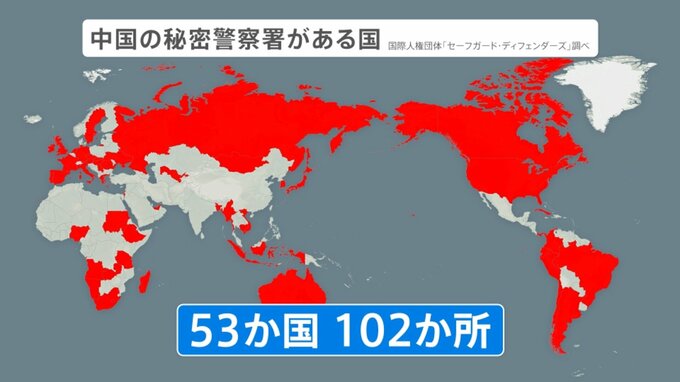
China’s overseas secret police are said to be active in more than 50 countries around the world. What is behind this? Using the example of the blank check movement that protested China’s zero-corona policy, the expert points out, “The Chinese government has been working with the Chinese government for years.
Professor Tomoko Ako, University of Tokyo (Contemporary China Studies)
The negative aspects of China’s Communist Party are spreading abroad, and they are reaching China in a backwash. This will lead to an increase in the voices of dissatisfaction in China. I believe that various measures are being taken to prevent the spread of such activities.
Yutaka Hagiwara, Director, Commentary and Specialist Press Office, TBS
If this is the activity of China’s secret police, this is a serious problem, but let’s start with an incident that was uncovered in New York in April.
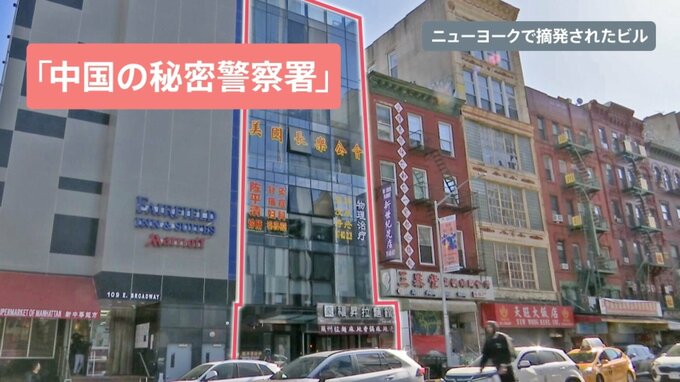
This building in Chinatown is a ramen store on the first floor, and it is said that a Chinese secret police station was located here. One of the arrested men is suspected of helping to locate pro-democracy activists under the direction of the Chinese Public Security Bureau, and of intimidating asylum seekers from China to return to their home countries.
Erika Yamamoto, anchor:
What kind of activities does this Chinese secret police engage in?
Hagiwara: Chief Hagiwara:
According to international human rights groups, they are targeting democracy activists and ethnic minorities abroad to monitor, harass, threaten, and pressure them to return to China. The purpose is said to be to block criticism of the Chinese government from abroad.
The number of such activities is said to be as many as 102 locations in 53 countries around the world. Last month, a prominent writer from China’s Inner Mongolia Autonomous Region was detained in Mongolia, where he was staying, and brought back to China. This is also believed to be a part of the activities of the Chinese secret police.
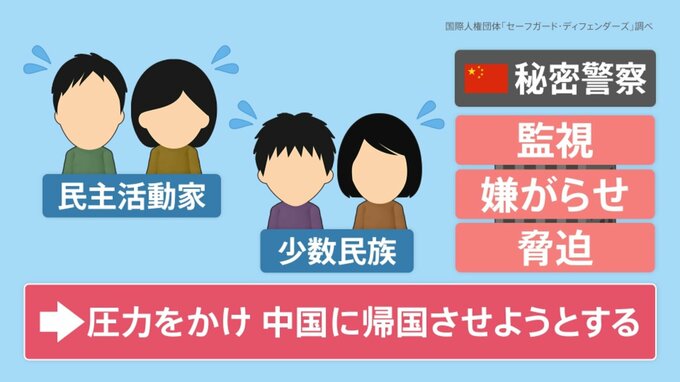
Caster Ogawa:
What is China’s view on the activities of the secret police in Japan?
Manager Hagiwara:
The Chinese Foreign Ministry responded to our question in this way.
Wang Wenbin, Spokesman, Chinese Ministry of Foreign Affairs.
Wang Wenbin, spokesperson of the Chinese Ministry of Foreign Affairs, said, “I emphasize that there are no so-called overseas police bases at all. China consistently adheres to the principle of non-interference in internal affairs.
Hagiwara: Mr. Director:
This is a complete denial, but on the other hand, Western countries are rushing to respond. For example, the U.S. strongly condemns this as a clear violation of its sovereignty, and the FBI is strengthening cooperation with investigative agencies in other countries. The United Kingdom announced last week that it had closed its bases.
Japan, on the other hand, has stated, “We have told China that any activities that infringe on our country’s sovereignty will not be tolerated, and we are working to clarify the situation. We have received very courageous testimonies. I believe that Japan needs to take this opportunity to hasten the clarification of whether or not these are activities of China’s secret police, and send out a strong message that Japan will resolutely protect human rights and freedom of expression.
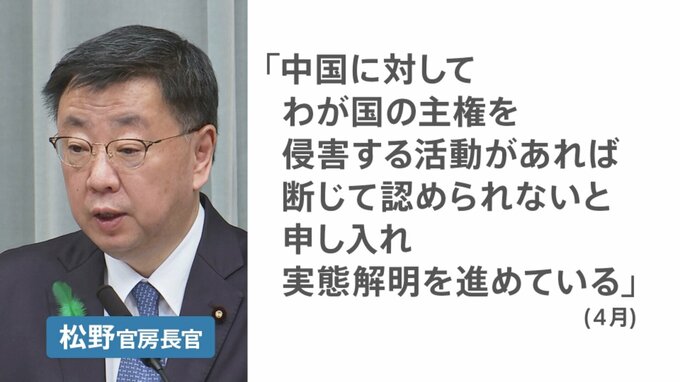
Caster Ogawa:
Facing China is a difficult task, but it is necessary to take a firm stand.





